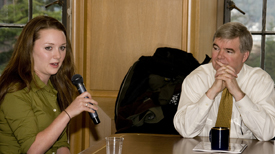UW President Mark Emmert served as the evaluator for Responsible Apparel Purchasing, the Jackson School task force that explored labor issues for UW-related apparel. Here he shares his thoughts on the undergraduate task force and the issues explored.
Why did you agree to serve as a task force evaluator?

I agreed because the University has a substantial interest in the issue. Where and under what conditions apparel bearing UW registered trademarks is made—and from which, by the way, the University profits—is important. Universities across the country have been struggling with ways to affect the very complicated supply chain of manufactured goods. Here we had a group of students who engaged this issue head-on and were able to go to Guatemala and see for themselves what conditions are. It was a great learning moment for them, and I was thrilled to be a small part of it.
Do you feel that the students grasped the complexity of the issue?
Oh, no question they got it. The combination of seeing what people had written about it and then getting on the ground and seeing for themselves what conditions are like was eye-opening, as you would expect it to be. The challenge is what to do about it. I think they discovered that there’s a wide gap between taking steps to address specific local conditions in one factory versus systemic changes that could improve the whole industry. It’s a very tough problem. If it were easy to solve, someone would have come up with the solution by now. But it’s not.
Is there a way for the students to be part of the process as the UW continues to deal with these issues?
Yes, there is, and they are already doing so. The Licensing Advisory Committee, co-chaired by Political Science Professor Margaret Levi and Trevor Griffey, a graduate student in History, has been working on this issue and has embraced the work the students have done. They have collaborated on a set of recommendations for the University to implement with its licensed suppliers and with the two U.S. monitoring organizations, the Fair Labor Association and the Worker Rights Consortium, both of which the UW belongs to. The students from the class are continuing their work in collaboration with the Committee. It’s a great learning experience, and we hope, of course, it results in greater accountability on the part of our licensees.